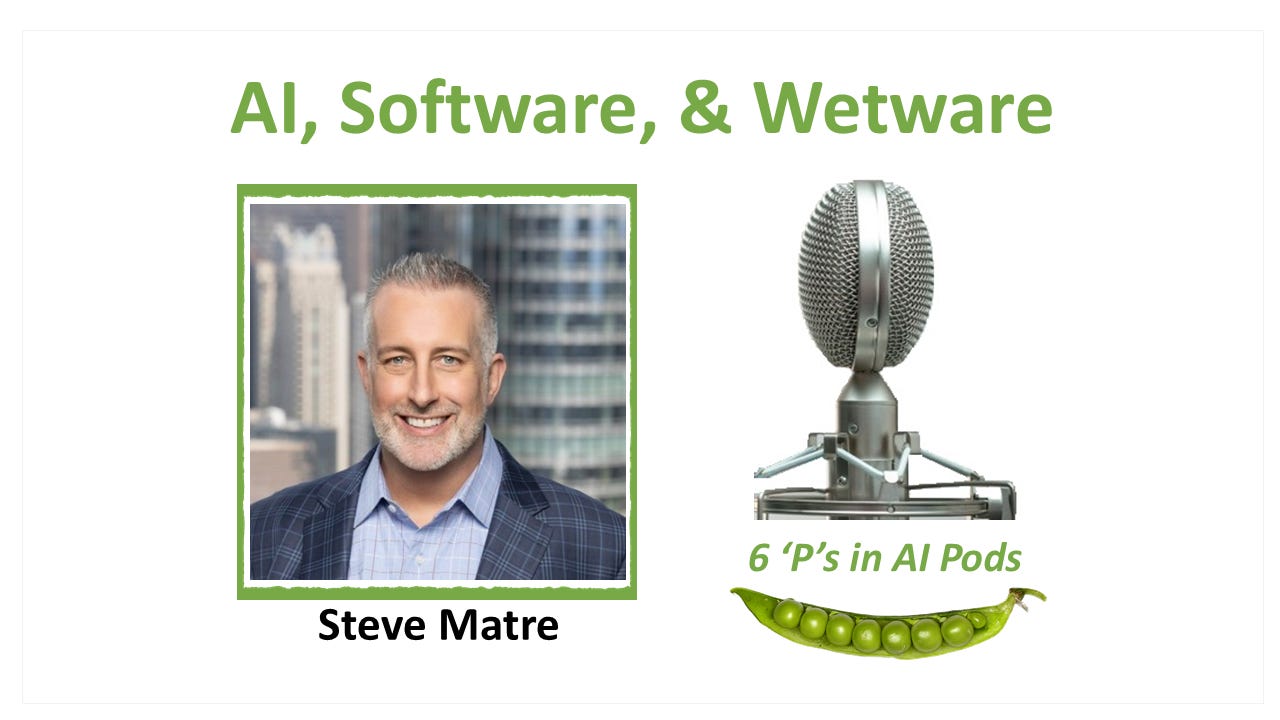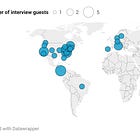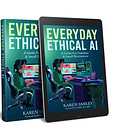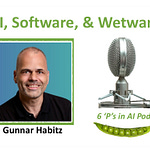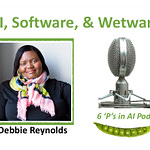Introduction - Steve Matre
This article features an 🗣️ audio interview with Steve Matre, CPA, CPM, PHR, a 🇺🇸 USA-based property management executive. We discuss:
how property management firms are using AI to offload staff from tedious work so they can focus on human interactions with residents
why he finds ads based on data sharing helpful and not creepy
how AI is helping with fraud prevention and how the shift towards a gig economy is changing how applicants’ data is evaluated
using AI tools to critique his writing, rather than writing for him
his thoughts on past AISW interviews with Natalie Phillips and Debbie Reynolds
and more. Check it out and let us know what you think!
This post is part of our AI6P interview series on “AI, Software, and Wetware”. Our guests share their experiences with using AI, and how they feel about AI using their data and content.
This interview is available as an audio recording (embedded here in the post, and later in our AI6P external podcasts). This post includes the full, human-edited transcript. (If it doesn’t fit in your email client, click HERE to read the whole post online.)
Note: In this article series, “AI” means artificial intelligence and spans classical statistical methods, data analytics, machine learning, generative AI, and other non-generative AI. See this Glossary and “AI Fundamentals #01: What is Artificial Intelligence?” for reference.
Interview - Steve Matre
Karen: I am delighted to welcome Steve Matre from the USA as my guest today on “AI, Software, and Wetware”. Steve, thank you so much for joining me on this interview! Please tell us about yourself, who you are, and what you do.
Steve: Of course. First of all, thank you for making some time to talk to me. I’m a big fan of your podcast. I really appreciate the conversations because you make it accessible. And it’s fun to see how quote-unquote normal people are using AI tools these days. So I really appreciate the time.
I am in a little bit of a transition at the moment. I’ve actually spent the last 30 years in the apartment property management space in the United States. My last job came to an end last fall simply because the private equity owner of the last company that I worked for restructured the management group for apartments in the United States.
I’ve always been a fan of public speaking. I’ve been lucky to do that through my career. I have held leadership positions in accounting, property management, operations, training, marketing and HR. So I’ve been able to flex a lot of my different business muscles, and I’ve always loved public speaking. So over the past year I’ve been leaning into doing a little bit more speaking at conferences. I will talk to whoever will listen to me. I really enjoy the speaking.
I’ve also been dabbling in consulting. I have started my own consulting company, and right now my goals are pretty reasonable. I am basically the product. And I lean really heavily into the people side. I like to consult on leadership and also about company culture. I also am open to working with suppliers to our industry, to help them be a little bit more successful in getting business, and property management.
On the personal side, when I’m not working, I am really a bookworm, so you’ll find me with my head buried in a book. I’m a big walker and runner, and I am a college football fanatic, so I’m very busy on Saturdays this time of the year!
Karen: Yes. We are here too, in the south, so we watch a lot of ACC football. That’s definitely a seasonal thing. Saturdays get taken over!
Steve: Absolutely.
Karen: Let’s talk a little bit about your level of experience with AI, machine learning, and analytics. I’d like to hear if you’ve used it professionally or personally, or if you studied the technologies.
Steve: I would describe myself in the AI space as a beginner. But I’m open to trying everything. In terms of studying, I’ve done a fair amount of coursework to really just try and form my own opinions, not only about using the tools, but about where artificial intelligence fits in your daily work and personal life.
I’m fascinated by all the predictions that people are making about the percentage of the workforce. I think it’s something like maybe 10 to 15% of the workforce is not really going to be eliminated, but their jobs are really going to shift over the next five to six years. I think that’s fascinating.
I also do like to try to understand what’s under the hood and how these models get trained. I think that I might understand a little bit more than the average person, only because I’ve done some really good LinkedIn Learning career tracks. I studied large language models, how they’re trained. And I’ve learned some of the acronyms, so I can definitely talk the jargon.
I’ve been trying to try as many different tools as possible. One of my recommendations for people – I have a few – I like to mix it up. I completed this learning path called Career Essentials in Generative AI by Microsoft on LinkedIn. It was a really helpful learning path. It was about eight and a half hours of content, and it started with an understanding of how the models are being trained. And then it dove into Microsoft Copilot and ChatGPT. So it really gave a good sense of what I could do with these models in my work life, but also personal life. It’s really solid stuff. So it gets you thinking about the efficiency side, but it also dives pretty far into ethics around the use of data.
And then I do like to mix it up. I stumbled across a few really good university certificates. I think most major universities now have either a degree or a certificate in AI. I think the one that I am going to do next is, the University of Wisconsin actually has one called the Introduction to AI Prompting, and it’s a five-week learning path that covers a lot of really solid stuff. And I think it’s a reasonable fee. It’s something like 1900 bucks. So it’s a little bit of an investment, but it’s probably pretty solid stuff. But like I said, you could Google and search for almost any major university certificate program in AI. And then I’m also a big fan of Coursera. So between LinkedIn learning, universities online, and Coursera, that’s really what I’ve done my learning through.
And then on the personal side, I am really not a wearables person, so I feel like I’m not generating a lot of personal data. I’m a little bit of a traveler. I like to take weekends away and I have no idea where I’m going half the time. So I am using Google Maps all the time.
Of course I am a big user of social media. And I’m a big user of things like AccuWeather. So I know that’s based on monitors all over the place, all over the world. Streaming music, uh, streaming entertainment, and online shopping. So I know that I am using a lot of AI tools all the time.
I think that a lot of people think it might be a little bit creepy that you search for one product and then, all of a sudden, the ads start popping up all over the place. I’m actually one of those people who loves it. I think our devices are always listening to us. You have your phone at dinner with a friend and you say something about wanting a new shirt, and then an ad for that shirt pops up all over social media. Like I said, some people think it’s creepy. I think it’s really useful. I really don’t mind that our devices are listening to us.
I also really appreciate the new search experiences with AI. I like a nice summary over a list of links that you have to dive into. And then of course, I’m a big believer in using ChatGPT for all the fun things, like: give me some workout ideas, recipes, what movie should I see this weekend? So I really appreciate it for all of that stuff.
Karen: Thank you. That’s a really comprehensive overview of what you’ve done with AI and machine learning so far, and I appreciate the recommendations of the courses as well.
You mentioned a lot of ways in which you are using a lot of these different services, although not wearables. But what are your thoughts about any smart technologies in your home? Do you have them, or do you avoid them? Or what’s your stance on those?
Steve: I don’t really have a stance. For the people who love them, that’s terrific. For some reason, I’ve always resisted them. I stop with my smartphone. I have it attached to a Bluetooth speaker. I’ve never really felt the need for a smart doorbell. I’m one of those old-fashioned people. If someone rings my doorbell, I still answer it. I know that’s revolutionary these days. And I don’t have it hooked up to video or anything. Just like the wearables, I just don’t do it. I just have resisted those for some reason.
Karen: That’s perfectly reasonable. Some people resist them for privacy reasons, but it sounds like you just don’t feel much of a need for them.
Steve: Yeah, that’s right. Yeah.
I would love to share some of the stuff I’ve done in the business world, because I think there might not be a lot of people who are familiar with property management, but it’s a really growing industry, probably about 50 million professionally-managed apartments now in the United States. For anyone who’s not familiar with our industry, it’s really similar to retail or hospitality. And a property management company is basically composed of the teams at each apartment community. It’s a geographically spread-out business, plus a corporate support team.
And the thing that really makes our industry unique is that each apartment site team is expected to handle a really wide range of responsibilities. So a community manager and her or his team is going to be responsible for strategy, curb appeal, sales, marketing, and then administrative and maintenance tasks.
So it leads to these teams having a really big workload and there’s a lot of foot traffic into the offices. People coming to tour, or residents who need help, vendors coming in to check out keys to paint and clean, and things like that. So there’s a lot of companies out there in our space that are developing products that are going to enhance productivity and help with a lot of our pain points so that the teams are not always worried about the next interruption or distraction.
I would love to just share some of the things that I’ve used and some of those platforms, if you don’t mind.
Karen: Absolutely. Please do.
Steve: Yeah, so I think there’s a lot of folks out there developing predictive technology. Our business is like any other; we rely on a whole set of KPIs to measure the business, but it’s going one step further. There’s a lot of A.I. companies that are saying, “Based on these 35 KPIs, as an example, here’s three concrete actions that you can take this week, which apartments to lease, which ones to get ready for the next resident next.” Things like that.
I’ve also used note-taking tools like Zoom. They pop up all over the place now because we are a really meeting-heavy business, because we’re so geographically spread out. So those have become really helpful.
Some of the administrative tasks, like our property managers will receive an invoice, and they used to have to code them and send them off to the corporate office to be paid. Now most companies demand e-invoicing and we use procurement and invoice coding AI. And that saves so much time for the team and for our accounting teams for the A.I technology to code those invoices.
I think the biggest one so far is probably customer relationship management. So a typical 200-to-300-unit apartment community is going to generate 30 to 60 inquiries every week. “I’d like a one-bedroom apartment.” And for our leasing teams to keep up with all the follow up and reminders, that’s a lot of work. So the AI tools in the CRM space, the Customer Relationship Management space, have really gotten very good penetration. I’d say that probably 50% of apartment management companies are now full AI. So if you’re looking for an apartment, and you reach out to a community, the response that you get back is probably going to be an AI bot. But the technology has gotten really good. You create a conversation; they’ll schedule an appointment and sync it to your calendar.
There’s also CRM tools now that communicate with current residents to collect past due balances and converse back and forth and take service requests. If you need something fixed in your apartment, most companies now have that completely AI-driven, so the maintenance team is alerted. They fix the problem, mark it as complete, and then do follow up conversations with the resident through machine learning and AI technology. So that has been an awesome productivity enhancement.
And then we’re also using a lot of fraud prevention tools. There’s a lot of fraud in the industry. A lot of people will give us fake paycheck stubs and things like that, that have been altered. And the AI tools that are trained on the generative adversarial networks [GANs] can spot 10 to 20,000 different ways that someone could alter a paycheck. So it’s been a really good way to root out a lot of fraud as well.
And then I would like to call out some of the ways that companies are creating AI-powered platforms to help our industry. We tend to have very pretty complicated enterprise financial software packages that provide business intelligence and predictive analytics. And there are companies that are integrating on top of those to, like I said, provide predictive analytics and recommend strategies. There are companies that are developing sort of TurboTax-ish environments so that property managers can enter revenue and expense assumptions. And it allows the system to use AI to spit out next year’s budget projection in a matter of minutes versus days.
And there are systems that monitor social media mentions and reviews coming in from prospects and residents in real time so that our property management teams can respond really quickly. And that’s been a really good sort of brand listening tool and it allows us to quickly rectify issues with our residents.
And then for smaller companies that don’t have really robust training departments, there are companies that can upload and train agentic models. They can scan in the lease. They can scan in all of our policy and procedures along with internal communications like emails and memos. And it can basically create an agent that can instantly answer any questions for our newer employees about policy and procedure when there’s not a trainer available.
So there are just so many companies out there that are creating AI platforms that have been extremely valuable for property management.
Karen: Yeah, it sounds very comprehensive. A couple of questions have come to mind. You mentioned customer service, service requests or maintenance requests. A lot of that is done through AI chatbots nowadays. Do you know, is it fully automated, or do people actually have a way that, if the bot is just not understanding what they need, they can still reach a human?
Steve: Not fully automated; they can still reach a human. It’s an interesting business model. There are a lot of management companies that are opting to have no people in their offices, and that is a very limited piece of the industry, but they’re experimenting with it. And that’s not just property management. As you know, it’s almost every industry, they’re trying to achieve the payroll savings. And a lot of companies are putting the people back, because there is pushback from customers. So if the bot is not understanding, you can always stop in the office. You can call in the office and talk to a human. And a lot of property management companies are also embracing a call center model.
So even if there’s no team in the office, there’s going to be a centralized group of customer service representatives. It’ll just be in a corporate office or a call center instead of in each apartment community’s office. So it’s not fully automated, but boy, our technology and property management is really starting to mirror a lot of the bigger industries across the economy.
Karen: Yeah, that makes sense. And another thing that I was wondering about is, you’ve heard a lot about financial decisions and using AI to analyze them and to make recommendations. Do you have any experiences with AI tools that recommend decisions about who to rent to or who not to rent to? I’m curious about how objective those tools might be, because there have been some stories. It seems like they could potentially be more objective than humans, but in practice there have been some reports of biases based on race or gender and things like that.
Steve: Yeah, my answer might surprise you a little bit. The resident qualification process remains a little bit old school in some senses. So there’s pieces of it that are AI-driven. So our model remains pretty simple. Most landlords and property management companies screen and evaluate an application. And where a human being might be biased, a human being might be saying that they’re evaluating the person or the applicant. What we really want to do, because of the Fair Housing laws, we’re not evaluating the person. We’re evaluating the information they provide to us on a rental application. Race, gender, and other “classes” are federally protected classes under the Fair Housing laws. The scoring model remains simple. If your rent is a thousand dollars, most landlords look for something like 2500 to 3000 in monthly income. Well, that’s simple math, based on paycheck stubs. So the AI comes into play to make sure that the documentation is authentic and it hasn’t been altered. But the math is very simple.
Many landlords, many property management companies are running a criminal background screen. That varies by state. Obviously, we have to comply by state and local laws. So where they’re allowed to, they pretty much are. And there’s models set up based on different things that pop up on a criminal background screen. It’s typically either a yes or a no. There’s not a human being who’s looking at it and saying, “Well, that’s an easy mistake, they were only 22 years old.” So I feel like the machine is not biased in the sense the human being is going to be a little bit more biased. So it’s basically income and then credit. We still rely on the credit bureaus, and it’s always going to be a range. Let’s just use 750, I’ll just throw a FICO score out there. Some companies might say that’s excellent. Some companies may require maybe a $200 extra deposit before you move in. So the models are automated and remain yes/no, and A.I. really only comes into play with fraud detection.
Karen: You mentioned the different kinds of adversarial networks, the GANs, that look for fraud. And I think that’s interesting because there’s talk about using AI for writing, and then also using AI to check for plagiarism. In the same way, it’s sort of checking on itself, but it also can be wrong. Students get accused unfairly of plagiarism. I wonder how often these GANs flag a paycheck stub as false when it’s not.
Steve: I remember when fraud and fraudulent documents became a real issue. The fraudsters are very good. So I think the AI’s been really helpful in that regard. And then the tools that are – I don’t think it’s artificial intelligence – there are a lot of platforms out there that go one step further. So when you’re qualifying a potential resident to live in your property, they have to create a login and provide a paycheck stub. And the system will actually look into the company’s payroll system to verify those numbers.
So the way we qualify our potential residents has become better and better and more tied into technology. So the biases, maybe part of it has been taken out of it. Because you can’t argue with, if a system is logging into the bank and seeing those paychecks being deposited, that’s just black and white. You say you make this amount of money, your payroll company says this, so we’re going to believe the payroll company. So that’s where technology has really locked that down and it’s taken the what ifs out.
Karen: So for people who have a corporate employer, that system works. There’s the whole range of freelancers that, I think in some cases, they’ll ask for previous years’ tax returns. And then of course, you would get that data from the IRS, right?
Steve: Correct. Yeah. Yeah.
Karen: It’s an interesting system. I had a little personal experience with property management on both sides: with a condo association and being on the board and working with the property manager, and then living in a condo and dealing with the property manager there. You get to see different aspects. And I’ve rented out my own properties, so I’ve been going through the background checks and qualifications and everything else. That’s been some time now. But it’s really interesting to see that, and be able to see how the technologies that are used in other industries could apply in this one.
Steve: It has changed over the last few years because the gig economy has become so big. There’s such a bigger percentage of people, of renters and homeowners, who are making money in a number of different ways.
So to your point, there’s a little bit of subjectivity in that a landlord has to be flexible enough to consider some other information. Because there are some cash businesses, plus the gig economy. Some of the systems are not perfect, but most landlords are open to hearing the whole story, obviously. Income from a gig job may be documented by a tax return.
Karen: That sounds good. How about in your own business that you’ve been working on? Do you use AI for any of those purposes?
Steve: I’ve used a lot of AI in my own business. I’ve become such a fan because I see the productivity side of it. And I love to think of artificial intelligence as my own personal assistant. I definitely use ChatGPT to create a business plan. I sort of brainstorm with the system. I also really like Claude, so I tend to use ChatGPT and Claude together. I use them to create basically a full marketing and promotion plan. I use Copilot in almost every Microsoft tool to create proposals and presentations.
I’m also a big fan of Canva, because when you’re on your own, you’re also doing your own marketing. So I’ve used Canva and all of their AI tools now to create marketing templates for the different segments of my business. You know, coaching versus consulting versus advising.
And then I recently discovered Apollo AI. I was turned onto Apollo AI to prospect for clients. It’s a more affordable tool than some of the other ones that are out there. When I say I dabble in consulting, I haven’t gone fully out there yet, so I don’t have my own website. But I think that I’m going to use some of the AI tools through, like, GoDaddy AI. That looks like a pretty comprehensive platform.
After I prepare a presentation, I go ahead and use ChatGPT to review my presentations versus having an assistant. It’s sort of comical. It makes you feel good about yourself. Because it’ll usually come back with some comment like, “Boy, what a snappy presentation.” So it gives some good feedback, moving slides around, some design, but it always makes you feel really good about your work.
Karen: That’s by design. It keeps you coming back.
Steve: Yeah, exactly. Exactly.
Karen: Yeah. And what you’ve described, the different purposes that you’re using AI for, makes a lot of sense. I hear from a lot of solopreneurs that are using AI tools for similar kinds of purposes.
Could you share a specific story on how you’ve used a tool that included AI or machine learning features? I’m interested in your thoughts on how the AI features of the tools worked for you or didn’t. Basically, what went well and what didn’t go so well?
Steve: Yeah, I can share a few. These are fairly common in my industry. I mentioned that the customer relationship management and resident relationship tools are so helpful with productivity only because we rely on our site teams to do so much. But they get interrupted all day long with people coming in. And they have to serve those prospects right away, and they have to serve the residents really well for our success.
The problem that the digital space created was all the people that are inquiring of us. It’s become such an email business, it is easy to reach out to many apartment communities. Most people don’t just walk into an apartment community anymore to look. They will email first and get some basic information. So the pace of incoming inquiries is so high. The artificial intelligence that can converse back and forth to answer those basic questions has been so helpful.
And the way those typically roll out, there’s a few really good companies now, but we set up the model ourselves. We’ll have an internal committee. We’ll rely on those site teams to build the knowledge library, and then the vendor partner will also scrape our websites.
And the things that worked well were the success basics. They solve a really specific need. There are a few really solid vendor partners in our business now. And we always involved our frontline folks if we did a rollout. And after training and rollout, if the system was generating some information that didn’t seem correct, we will quickly step in to take care of that with the vendor. For instance, if most of the conversations begin as simply as, “Hi, I am looking for a one-bedroom apartment”, and the model might respond. “Oh, that’s terrific. What size apartment are you looking for?”
But the vendor partner, they’re always very helpful. We have weekly success meetings and say, like, “Hey, we need to work on this.” So the model gets better and better very quickly, and they’re open to our feedback. The success is, as promised, our teams were able to really personalize their presentations when people showed up on site. So they were able to spend more time touring the property with potential residents, because they knew that the ongoing required follow-ups and conversations with prospects were going on, and those prospects were being responded to very quickly. It just handled the stress of all the interruptions very well, made our teams give a much better presentation when they knew that the communication requirements were being met. Plus the technology has gotten so good that I think 99% of people don’t realize that they’re dealing with AI. I think it has been really solid and it’s really fun to see.
I think areas for improvement are basically just on the setup side. And it’s on both sides, vendors and our own teams, just to populate those information libraries really thoroughly, and then helping the models be better.
So I would say that by far the most impactful thing for my industry has been customer relationship management tools.
And then for myself, when you are on your own, I’ve used ChatGPT and Claude, not only to build out my own speaking offerings, but also tools and job aids. I’m floored by the way the models keep improving by taking things to the next level. So if I’m wanting to speak at a certain conference or a workshop, I need to design my own content. I’m on my own, so I will use ChatGPT and Claude to workshop a session description and a title, and it really helps me with that.
So it gets me started, and then of course I put my own sort of Steve-ism’s into it. But then it’ll just go ahead and ask those follow up questions like, “Do you want a punchier version or a shorter version? Or a really short version that fits any conference marketing materials?” So it feels like I have my own marketing team sitting with me. So I can just send off some ideas to a conference planner and I can say, “Here’s a 150-word description. Here’s a 75-word description. Here’s a 25-word description.” based on what you’re looking for.
And then if I wanted to design some tools and job aids as giveaways to accompany my presentations, I can brainstorm (in air quotes) with ChatGPT and Claude to make those basic tools. And it’s surprising how good they are. You can say that you’re looking for a tool that fits property management. It gives you a nicely-done tool and job aid. So it’s just really impressive.
And then I use ChatGPT and Claude for building on a marketing plan. I was able to take my initial goals for my business, and I was able to converse back and forth with ChatGPT and Claude, not only to set some basic revenue goals like pricing, how to price my services, but also to brainstorm social media and content for promotional ideas. So it’s been super helpful for me in a lot of specific ways.
Karen: I hear a lot of people find value in large language models for brainstorming, and for having it review and poke and ask questions about the content to help you improve it. I’ve also heard from some folks that LLMs are not good with numbers or with timelines. So how did it work for setting your revenue goals and making your plans?
Steve: It didn’t work so well in revenue. But truth be told, I probably didn’t prompt it very well. As someone setting up a business, I wasn’t exactly sure what my pricing model should be. I probably didn’t prompt it very well, and I had to rely on my network of folks, of real people to advise me. There’s still a role for human beings. But then the revenue side, it was not so great.
Karen: Yeah, makes sense. So it sounds like you’ve made really good use of a lot of different AI tools. I’m wondering if you have avoided using AI-based tools for some things, or for anything. And if so, if you can share an example of when you avoid it, and why you choose not to use it?
Steve: Sure. There’s a few right now, I would say. I love social media. I’m such a fan. And right now my big, big ones are LinkedIn and Substack, only because I think everything’s changing so quickly in the world that you just need to monitor what’s going on, or you just lose pace really quickly. I also love to contribute to the conversation. But I’ve resisted using AI tools. I will definitely use AI tools to brainstorm ideas and content for myself, but I’ll sort of use it as prompts. But I prefer to create my own social media.
So when I’m writing something on LinkedIn, it’s always going to be me. It’s not going to be AI just because I think that social media posts that are 100% AI, they just reek of it. It just doesn’t write like a real person. And when there’s a list of all the emojis and jargon ... I just really think social media should still be fairly real and organic, again, in air quotes, because I do realize that a lot of people are using AI.
And then when it comes to news, boy, the artificial intelligence video is becoming so good that I still curate news sort of the old-fashioned way. And I do it as a mixture of, I watch my favorite networks, I still get my favorite magazines. I just don’t want to rely completely on the social media algorithms to push news my way. I want to try to go to the sources I always have, including the old-fashioned newspaper. And then I want to parse through it and create my own opinion of what’s going on in the world.
Everybody says you should use video all the time. I don’t create any video using AI at the moment. But it is definitely something as a solopreneur that I want to dive into, because I do realize how video is much more compelling. I just haven’t really felt the need to play around it. You’re probably more the expert of this. I’ve heard Sora is a really accessible platform. I think that’s the one I want to try next. That makes it really easy to make good quality video. I’m just not a fan of making video of myself for social media, so I think those are the things I’ve really resisted.
Karen: So you want to create a video, but you’re not thinking about doing, like, a LinkedIn Live or a Substack Live?
Steve: Right, exactly. I know I’ll probably get there. But, yeah, right now I’m not so comfortable doing that yet.
Karen: Is there anything else that you’ve avoided it for? You mentioned that you want to do your own writing. Have you ever tried the image generation tools or the music tools?
Steve: I have not tried image generation or music tools. I haven’t had to yet. I was an English major, so there’s a pride piece of me that says I should still be able to write a basic email. But I will cop to this: if there’s a really important email, there’s something on the line, like a business deal or something, I will feed my email into ChatGPT, say, like, “Hey, could I make this a little bit more formal?” So I will cop to that.
Karen: So that’s a critique. It’s not writing it for you. You’re having it as a reviewer, editor, advisor sort of thing?
Steve: Yes, yes. Yeah. Thank you. It’s a critique. I’m going to use that from now on.
Karen: Yeah. But it is actually getting hard to avoid having help with email. And even LinkedIn says, “Here, write with AI”. No, I don’t want to. Or the email clients all offer AI.
Steve: I mean, AI is making its way to absolutely everything, so it is so helpful. But boy, you want to sound like yourself still every once in a while.
Karen: One very common concern that I hear a lot about is looking at where these AI and machine learning systems get the data and the content that they trained on. For instance, Sora, where did they get the videos? And all the large language models, where did they get all the texts that they use? A lot of times they’ve used data that users put into online systems or they published online, maybe under a copyright, maybe not.
But the companies are not always very transparent with us about how they intend to use our data when they sign up. I’m wondering how you feel about companies that are using content for training their AI and ML systems, and specifically what your thoughts are about what it means for a company to be ethical? And whether they should be required to get consent from people and credit them and compensate them when they use their content? Or if you feel like, in the service of the greater good, that it’s okay for them to basically take it without permission?
Steve: You’re probably going to be disappointed in my answer. Okay. And the reason is, I feel like I’ve gotten really wrapped up in the whole AI as a phenomenon. Because I think that I just cannot believe how usage has accelerated so unbelievably quickly. And when I’m speaking to a group or an audience about AI, I’m one of these people who wants to encourage people. I want to share some statistics that I found. But I also want to encourage people not to lose faith in their humanness and really how to future-proof themselves through their soft skills. Because I do think, moving forward, it’s going to be your good leadership. It’s going to be your creativity. It’s going to be really your humanness that separates you from the pack as AI becomes more and more prevalent in the business world.
So in terms of how the models are trained, using copyrighted material to feed in, I’ve definitely been monitoring the lawsuits. I don’t want to call out any specific one. And I’ve been thinking a lot about this because I don’t really produce a lot of content for pay, but I am someone who puts myself out in the world through speaking. And I don’t know that I would want someone just grabbing what I’ve put out there without giving me credit.
It’s really an interesting facet. I would love for authors to get credit and paid for what they produce. And I feel that way for a number of reasons. I think it’s a fairness thing. And I think that we are a capitalist country. You put things out there, and we are a free market economy. Your work has value.
So, like I said, you’re going to be disappointed in my answer because it’s something that I don’t really have a great opinion on it. I’m one of these people who, as I started learning about AI, it’s like, “Wow, these models have been vacuuming up everything they possibly can to learn.” I’ve just dived in and started using the tools. But I never really thought about an individual author. I don’t exactly know how that would work except for each company to buy the book. Or you know, if they’re going to use a new model, they have to buy the book, but then they’re buying the book for a hundred million people to see. So yeah, I wish I had a better opinion on this, but I just don’t. I’m just one of these people who’s gotten really swept into the whole trend.
Karen: It’s definitely a thorny question because the sheer scale makes it very different from a library that buys a copy and puts it in, and then lots of people can take it out, but only one at a time.
Steve: Yes, one at a time.
Karen: So it’s quite different. I think the latest count was 44 lawsuits in the US [at the time this interview was recorded, in early October; the count is higher now]. There’s a guy named Edward Lee that keeps track of them. You’ll like the site name. It’s called ChatGPTiseatingtheworld.com. He’s on Substack, actually (
).
Steve: Yeah. I’m a podcast addict. I listen to a lot of podcasts and there’s a few hosts that are also authors. And the thing that’s really interesting to me, you can probably share more on this, is an author will have written three books, but you can go on Amazon now. There will actually be five books by that author, books that have been generated and are for sale. That’s the piece of it that I really don’t understand and haven’t looked into. Phony content by those people is put out there, and they’re not getting credit for it. That’s the thing that I think is obviously really shady. So this is definitely something that’s going to develop down the road.
Karen: When you get around to putting up your website for your business, you’ll have to think about how to protect your materials or if you care about protecting them.
Steve: Fair enough. I do. I do. Yeah. Fair enough.
Karen: I’ve talked to some entrepreneurs. A woman in Cornwall has these training materials. And she said she doesn’t like the idea that hers would be scraped. But she knows that her real value is in her, and the way that she delivers the courses. So, if someone’s going to steal her materials, they can’t steal her and her brain and the way she communicates. So she wasn’t too worried about it. Some people worry. Some people use these poisoning tools to poison their images before they’ll put an image online – at the University of Chicago, called Nightshade and Glaze, that people use to protect their images. But then it gets to be a bit of an arms race.
Steve: Right.
Karen: Then they want to find a way to get around the poisoning. And then the poisoning gets better. And back and forth.
Steve: Yeah.
Karen: But yeah, a lot of people find it hard to reconcile. On the one hand, they feel like, yes, consent should be required. They should be credited. They should be compensated. But at the same time, a lot of people were still using the tools that were built on the content that was not credited, and not consented and not compensated. And it’s a bit of cognitive dissonance.
Steve: Yeah, I think I’ve listened to all of your episodes. I would probably lean toward her point of view. You can only do so much. You’re putting yourself into the world. And I think you do what you do for the people who are going to benefit from what you do. So the people who come to my sessions, or the people I coach and the people I consult with, I’m doing it for them. So if someone wants to come and hijack my stuff, I certainly don’t love it, but boy, I don’t know how to stop it. I’ll have to learn more about poison pills.
Karen: Yeah, Natalie writes Cornish fantasy fiction, in Cornwall, England. But she also does some training, and that’s a big part of her business as an entrepreneur. Those were her thoughts on the materials.
Steve: I like that.
Karen: As someone who uses tools, do you feel like the tool providers – ChatGPT, Claude, Copilot – do you feel like they’ve been transparent about sharing where they got the data that they use for their tools?
Steve: I don’t really think they’re transparent at all, unless I’m just not looking in the right place. Each of the frameworks is very slimmed down. You can prompt it. And there’s no disclaimers or information popping up about where the information was obtained.
The exception is when you ask more of a loaded or more involved prompt. You can see the websites it’s crawling immediately for the answer, but it’s very quick. The website logos pop up very fast and then go away. So you can kind of see the thought process, so to speak. But I don’t know that I would say it’s really clear or transparent.
Karen: Are there any times when you ask it a question and ask it for sources, and then it can give you some? I know some of the newer versions of the tools will actually give you citations, and some of them may be real and some may not.
Steve: It will give you citations. Like I said, I’m a bookworm, so if it comes up with something really interesting, I will ask for the book. I’m like, “Is that from a certain author or book so that I can go and read more from that person?” So the only time I do that is if I want to dig deeper on my own.
Karen: Okay. As a consumer or as a member of the public, our personal data and content is being used by AI-based tools and systems. Do you know of any specific cases that you could share?
Steve: I think another one of your really interesting episodes, and it was really recent, the woman who you interviewed specifically about data and privacy, I can’t think of her name.
It was fascinating. It was so educational. I’m one of these people who I read a lot of statistics about the amount and volume of data that is being uploaded to individual sites and produced every day. I think, boy, what are the chances of anything that I produce or put out there of having anyone stumble across it?
Just because of the sheer amount of data that’s ending up on sites like YouTube every second of the day, it’s so astronomical. But she had such a great take on what you should allow people to share and how you should opt out. And to me, I just never think about it. Because I’m like, boy, I’m one of the eight billion people that’s putting content out in the world now, and boy, it’s just an astronomical volume of data.
Karen: Yeah. That sounds like Debbie Reynolds “The Data Diva”. She’s really very down to earth and practical about “Here’s what you can do, and here’s what you need to worry about, and here’s what you don’t need to worry about.” She was a lot of fun to interview.
Steve: Yeah, she was terrific.
Karen: Do you know any companies that you gave your data to that made you aware that they would use your data for training an AI system?
Steve: I don’t have any specifics. I know I’ve seen the warnings, but like I said, I don’t look for the disclaimers. I’m sort of bad about opting out because I just am one of those people who just feels like, boy, there’s so much out there. I’m just like this tiny little dot in the data universe.
I am certainly open to taking advice on how to protect myself a little bit better. I do protect myself in other areas. I’m always changing usernames and passwords. But in terms of posting on social media, I don’t know where it goes and I don’t opt out.
Karen: Yeah. I think it’s one thing if you’re making decisions for yourself. In some cases, some people are making decisions for other people. They’re posting pictures of other people, or their kids when obviously their kids have no say in the matter. That’s, I think, a different thing. But if it’s just for yourself, then obviously you should feel free to decide what level you’re comfortable with.
Steve: Yeah. Sure. Yeah. Thank you. I’m going to follow your advice.
Karen: Everybody has to decide. One of the things that I talk about in my book Everyday Ethical AI, is that there are some things that you can do. We’re not helpless. We can take some control to the extent that we want to. But one thing I encourage everybody to do is just write down what their AI policy is. Like, “This is what I do with AI. This is what I don’t do. This is why. These are the tools I use. This is how I use them.”
Policy sounds like a very scary thing, but we all have one, whether we’ve written it down or not. We have ways that we’ve made our decisions. So it’s just writing it down and thinking about it. And what’s right for me is not going to be what’s right for you. But I think just the act of writing it down is a good thing. It helps us to think about our decisions and “Oh wait, do I really want to be sharing that or not?”
Steve: That’s terrific. That’s really sound advice. Very sage advice.
Karen: Well, thank you.
I typically ask people if they’ve ever had a problem with a company’s use of their personal data creating any issues. Like privacy issues or phishing or loss of income. Sounds like maybe that hasn’t happened to you, with the approach that you take to sharing your data on social media?
Steve: It has not happened to me, knock on wood.
Karen: Ah, you’re lucky.
Steve: Yeah, I’m lucky. I’ve been lucky so far. No issues.
Karen: Yeah. Most Americans have dealt with at least one data breach of some kind. And obviously that’s not AI-specific, it’s just something that’s been happening for years with all the data brokers scraping up our data. But yeah, hopefully it’ll stay that way.
Steve: Yeah. Thank you.
Karen: Yeah. All right, last question, and then we can talk about anything else that you want. Public distrust of these AI and tech companies has been growing recently. And I’m wondering what you think would be the best thing, or the most important thing, that they should do to earn and keep your trust. And if you have any specific ideas on how they could do that?
Steve: Yeah, I wish I had a better grasp on the technical side of things, but just one thing that comes to mind is the rate of hallucinations. And you already mentioned it, but people will write a work, a brief, and then it’ll create citations that don’t really exist. I think it’s so interesting, that piece. I have to admit, I have no understanding of how that happens, but those are the things that get covered in the media and it really does scare people.
I think that people being a little bit scared is probably good because I don’t like the idea that so many people are using AI to do all their creative work. I use the term humanness because it’s important to me as a creative. I’m a creative person. I was an English major, so I’ve always been a good writer, a good critical thinker. But I think that people shouldn’t just give it all up to the AI systems. I think they should use artificial intelligence as a start and then they should apply their critical eye. But I do think that these companies need to work on hallucinations. And I’ve embraced buyer beware throughout my life. I think the AI companies are a framework, a start.
When I speak about AI in front of an audience, I try to do a blend of, “This is what the AI companies can do for you. However, you should never give up your power.” And when you roll out a system at a company or roll out an artificial intelligence platform, so many leaders say, “Hands off the AI. We want to see what it’s going to do.” And I don’t really agree with that. I think that human beings inside a company are always going to remain the guardrail around quality control. They can make the systems even better. And people have to make sure that the platforms that they roll out are really hitting the mark. And solving the problem that they were contracted to solve.
Karen: Yeah, that’s a great point. And it is really important to keep our humanness and to also just to keep using our human brains, our wetware, along with our AI and software.
Steve: Yeah.
Karen: So, thank you, Steve. This has been a lot of fun. Is there anything else that you’d like to share with our audience?
Steve: The only thing that I want to share is, like I said, I’m a big social media fan. And I think LinkedIn’s having a moment right now. So I would love for people to find me on LinkedIn just simply because I love to connect and I genuinely love to learn from other people.
And I’ve got some fun speaking engagements coming up, specifically related to AI. I have this session that’s called “AI and you: finding your fit in a shifting world.” I share a little bit about the gurus that I learned from and also trends that I see with artificial intelligence. But then I pivot over to what are the kind of the soft skill areas that you should really focus on and continue to develop to make sure that your career is future proof? Because there’s definitely some uncertainty out there in the economy about being eliminated and companies are delaying hires, because they want to see what AI is going to do. I don’t want people to be fearful. I want them to continue to develop their soft skills to become really valuable for their companies. And I’m doing that next with the Chicagoland Apartment Association in October.
And then I’m headed down to Dallas to present at an e-learning company summit with a company that I used to do business with. I’m speaking about increasing the need for companies to continue to train their leaders as they move up the chain.
And then I’ve got some networking events prior to the end of the year that have some interesting topics in my mind. I’m speaking at one about “Coaching techniques that stick”.
And then I’m developing another AI presentation about how departments within companies really need to over-communicate and work together to make sure that they successfully integrate artificial intelligence into their platforms and to ensure success and really add value to the bottom line.
And I also am going to talk about some different career paths that I see that are being created in different jobs and roles that are being created because of artificial intelligence.
So that’s the kind of stuff about AI that really excites me is how it’s going to change the way we do business. And for people that are worried about maybe having their role eliminated, I think there might be some new and exciting job families that are created because of AI.
So that’s what I’ve got coming up in my life.
Karen: That all sounds good. You mentioned having a Substack. Can you talk a little bit about that? What’s it called? And we’ll make sure people can find you.
Steve: Okay. Again, you’re going to be really disappointed. I have a Substack and it has no content yet. Not yet. So the company name that I decided on for my consulting is Success Matters 365. My Substack name is something like “Success Matters Every Day Steve”. I definitely want to explore Substack and start throwing some content out there. Because I love Substack. I just haven’t dived in as much as I should have yet.
Karen: A lot of people that I talk to say that they use a large language model to help repurpose their LinkedIn content for Substack or vice versa. And by the way, if you change the name of your newsletter, that is totally normal. I’ve seen so many people that start out with one name, and then they change it to something else within a matter of months. I curate this directory of women that write about AI. I try to find people when they’re brand new. And sure enough, within a month or two, “Wait, the name in the directory is wrong because they’ve changed it.” I think it’s part of the process. That’s to be expected.
Steve: Yeah, absolutely. Yeah.
Karen: I’m glad that you’re on Substack. There’s so much good reading about AI on Substack nowadays. It’s incredible. I quoted over 60 different articles in my book from Substack authors.
Steve: Wow.
Karen: There’s just so much great stuff out there.
Steve: So I think I found you on Substack.
Karen: Yes, I think so.
Steve: I’m almost positive. Yours is terrific.
Karen: Oh, thank you! I appreciate that.
Steve: You’re definitely one of my AI gurus.
Karen: Thank you. That’s a kind compliment and I appreciate it.
Steve: You’re putting a lot of good stuff out there.
Karen: And this interview will be one of them, so thank you so much for joining me. I appreciate it. It was fun.
Steve: Yes, it was fun.
Karen: Thanks a lot, Steve.
Steve: Yeah, thank you. I’ll chat with you soon.
Interview References and Links
Steve Matre on LinkedIn
Steve Matre on Substack (Success Matters Every Day)
About this interview series and newsletter
This post is part of our AI6P interview series on “AI, Software, and Wetware”. It showcases how real people around the world are using their wetware (brains and human intelligence) with AI-based software tools, or are being affected by AI.
And we’re all being affected by AI nowadays in our daily lives, perhaps more than we realize. For some examples, see post “But I Don’t Use AI”:
We want to hear from a diverse pool of people worldwide in a variety of roles. (No technical experience with AI is required.) If you’re interested in being a featured interview guest, anonymous or with credit, please check out our guest FAQ and get in touch!
6 'P's in AI Pods (AI6P) is a 100% human-authored, 100% reader-supported publication. (No ads, no affiliate links, no paywalls on new posts). All new posts are FREE to read and listen to. To automatically receive new AI6P posts and support our work, consider becoming a subscriber:
Series Credits and References
Disclaimer: This content is for informational purposes only and does not and should not be considered professional advice. Information is believed to be current at the time of publication but may become outdated. Please verify details before relying on it.
All content, downloads, and services provided through 6 'P's in AI Pods (AI6P) publication are subject to the Publisher Terms available here. By using this content you agree to the Publisher Terms.
Audio Sound Effect from Pixabay
Microphone photo by Michal Czyz on Unsplash (contact Michal Czyz on LinkedIn)
Credit to CIPRI (Cultural Intellectual Property Rights Initiative®) for their “3Cs' Rule: Consent. Credit. Compensation©.”
Credit to for the “Created With Human Intelligence” badge we use to reflect our commitment that content in these interviews will be human-created:
If you enjoyed this interview, my guest and I would love to have your support via a heart, share, restack, or Note! (One-time tips or voluntary donations via paid subscription are always welcome and appreciated, too 😊)





